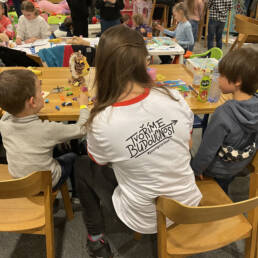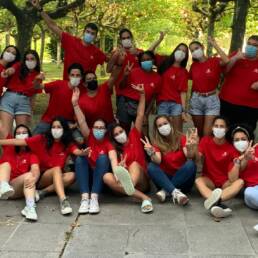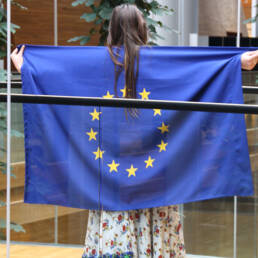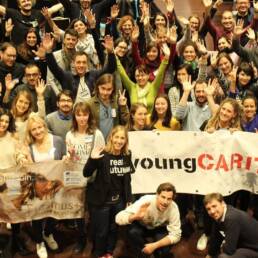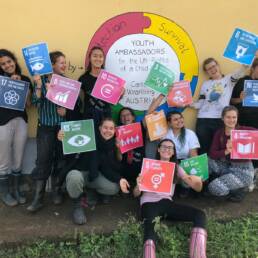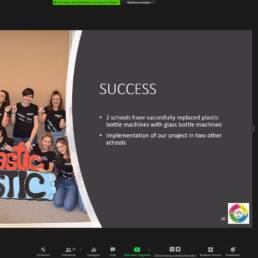Author
Agnieszka Zarzyńska
Institutional Development Officer – Youth Engagement
Tel: +32 (0)2 235 26 85
azarzynska@caritas.eu
We shouldn’t think about Mercy in terms of profitability. The Caritas ethos is one based on self-giving. Self-giving that does not ask what we might receive, or that is performed from a sense of obligation, but rather, is a free act of love.
One might think that our societies do not owe anything to people in need – the sick and weak, too young or too old, dependent, disadvantaged by fate or themselves. They only generate costs, force us to sacrifice and give up our personal aspirations. They make individual and community life more difficult. Jesus says about himself that he is in the “least of these”, and that by interacting with them, we build a relationship with God. To live the Gospel, we must learn to act “irrationally” and “unprofitably.”
Volunteering is just such an irrational and unprofitable activity that is often misunderstood by society. Recently, I met with volunteer coordinators from Diocesan Caritas to discuss the essence of volunteering. During the talks, we also touched on the subject of the social reception of their work. Concerned family and friends would ask if they are perhaps not being used, whether it would be better if they would do “something for themselves” or devote more time to the family. Coordinators of the volunteers meet these questions every day, and what helps them deal with them is the certainty that their work makes sense. Maybe not humanly, but definitely for God.
Nevertheless, the truth is that in addition to building ones relationship with Jesus, volunteering is a great way to acquire numerous competencies. In which ways exactly? Below is an example list of activities of volunteers from Caritas Network:

Caritas Hellas volunteers travel to various areas in Greece with the photo exhibition “My city, Athens…” which contains 45 photos taken by refugees and migrants, aiming to inform the audience about the refugee crisis and break stereotypes about refugees.
Volunteers in Belarus are masters of charity engagement. They work with orphans, children with mental illness and disabilities, and seniors. They assist at the centre for the people with disabilities and the kitchen for the people in the crisis of homelessness. They organize Caritas events and promote Caritas and parish social ministry in social media. What is more, they distribute humanitarian aid and… participate in an inclusive dance studio.
CAFOD, Caritas in England and Wales focused on work overseas, has a network of Climate Champions. These are young people who train themselves, organize campaigns, educate others and promote, where possible, the actions aimed at tackling climate change. They are even ready to address their MP to ask: “And what you have done to tackle climate change?”
In Spain, Caritas volunteers, among many other activities, are adopting grandparents! Young people visit the elderly, spend time with them and support them in coping with loneliness.
Ukrainian Caritas volunteers, besides engaging in campaigns addressing ecological issues, human trafficking and community development, are providing humanitarian assistance and art therapy for children from families in crisis.
In Poland, volunteers engage more and more in the promotion of integral ecology. They build gardens in parishes to encourage the parishioners to regain their relationship with nature and generally, our common home.
And last but not least, Moldavian volunteers are engaged in social theatre! They are putting human rights issue in the language of theatre and present it to the wider public to promote the rights guaranteed to the citizens of the Republic of Moldova.
What professions can Caritas volunteering prepare us for? Jobs that involve gardening, psychology, and communication, for example. It also helps develop artistic talents. In addition to these individual profits, volunteering plays an important social role – it educates us as a society and teaches responsibility for the community in which we live. It provides services that should be provided by the state, but unfortunately are still not.
But the motivation for Caritas volunteers is not to build one’s competencies, even though that is a bonus! By joining Caritas, volunteers often don’t know what awaits them. Despite this, they commit themselves to the benefit of others, because of a desire in their hearts to help those most in need. This desire is a call to act freely in self-giving. Not for points or quick profits. The most important lesson for volunteers from Caritas activities is the lesson of God’s logic – Divine Mercy.


